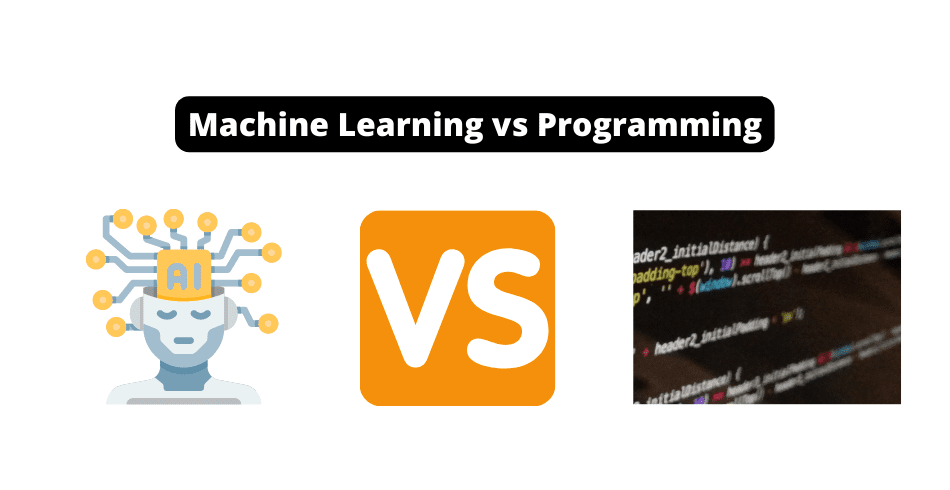In the world of technology, programming and machine learning are two distinct but highly related disciplines used to “make computers do things.”
The key difference between programming and machine learning is that programming relies on instructions from a programmer to perform tasks, while machine learning uses algorithms to allow the machine to identify patterns within data. Your machine will use these patterns to decide how to best proceed.
While that’s just the high-level difference, this article will dive deep into different scenarios, more examples, and some things that many need to consider when they think about these two.
Not a read you can skip!

What Is Machine Learning?
With how widespread machine learning has become, it’s almost easier to answer what machine learning is NOT.
It is the foundation behind some of the most innovative software currently in development, and many predict that machine learning will become an integral part of human life.
At its core, machine learning is the ability of computers to learn from experiences (data) without being explicitly told what to learn.
This means that instead of a computer being programmed to complete a task, it can learn by itself through observation, repetition, and patterns that we have no chance of recognizing.
Understanding machine learning and its benefits make it easy to see why it has become so popular in recent years.
As data sets grow, machines can independently identify patterns and draw conclusions about them without any external input.

Is machine learning the same as coding?
Whether machine learning is the same as coding has been constantly debated in recent years (all over the internet) – and it’s an important one to consider.
If we think of coding as “writing code,” these two are basically the same thing – machine learning engineers write code just like everyone else in the tech realm.
However, when someone refers to “coding,” they’re usually talking about software engineering.
While the reasoning behind this terminology is a little blurry, software engineering is generally assumed to be the role when someone refers to “writing code.”
If we use that ideology, these two are closely related yet have fundamentally different approaches; coding, traditionally seen as a product of software engineering, requires human instructions to make decisions, while machine learning employs algorithms that teach the computer to adapt independently.

Differences between machine learning and traditional programming
As we’ve expressed earlier, traditional programming and machine learning have some differences when it comes to the tech realm.
While traditional programming requires creativity, foresight, abstraction, and understanding of interlinking systems, machine learning is based on optimizing existing data to reach a particular metric.
Traditional programming allows developers to create something unique and novel, while machine learning relies on already existing data sets (Leave GANs out of this).
While traditional programming may be more suitable for entering new markets or creating something never seen before, machine learning excels at making small changes that can have larger impacts in areas such as efficiency or cost-effectiveness.
Machine learning is great for optimizing an existing system, but it often arrives at outcomes that even machine learning engineers need help to backtrack.
In contrast, understanding software written by a programmer on your team is an essential skill in software engineering and a core skill in traditional programming.
So, to break it down in simple terms, the main differences between traditional programming and machine learning are:
- Traditional programming is more creative
- Machine learning is based on optimization toward a metric
- Machine learning needs historical data
- Traditional programming can create things that don’t exist
- Software engineering is about understanding the software
- Machine learning has outcomes that sometimes aren’t understood
How Much Programming Knowledge Is Required for Machine Learning and data science?
Data science and machine learning have revolutionized the world of technology, changing how we understand and interact with data.
While these new technologies bring incredible insights, they still require knowledge of programming languages to be effective.
Data scientists and machine learning engineers must be familiar with coding techniques to design reliable models and support them in production environments.
While some tools, such as AutoML or Github CoPilot, are helping to simplify the process of building models, most of the coding involved is for setting up the Machine Learning (ML) infrastructure/operations (MLOPS).
MLOPS is continuous machine learning – where machine learning engineers and data scientists build pipelines and infrastructure to allow their models to maintain high accuracy and consistency in production environments.
So, while you can use AutoML or Github CoPilot to build a decent model quickly, you’ll need to really dive deep into programming to create a system that can support your models.
Why Is Machine Learning So Popular Now?
Machine Learning has been gaining popularity in recent years and is now a highly sought-after field, with professionals earning very high salaries.
This is because it is a relatively new field, where we’ve unchained our computers and allowed them to make decisions for us.
However, the ideas behind machine learning have been around for a long time.
Just think back to the terminator movies – the idea of robots making decisions for us isn’t new.
What is new and what really has unlocked machine learning is that computational limits are constantly increasing – allowing more complex tasks and models to be created by our machines.
And, to top it off, while computational is being pushed to the limits – data is everywhere.
Every company worldwide has started to collect and harvest its own data – no matter the industry.
And where there’s data, there’s machine learning.

Should I Learn Machine Learning Or Software Development?
Choosing between software development and machine learning can be complicated.
Both fields involve coding and building but have different goals, processes, and approaches.
Machine learning is much more mathematically dense with its focus on algorithms, data analysis, and data storage, whereas software development is more creative in nature.
As a general guide:
If I’m more interested in solving problems and more statistically focused, I would choose machine learning. If I am creative and love to build things from scratch and see them develop, I would choose software development.
Ultimately, it all comes down to what interests you most – I’d do a couple of projects first and figure out what aspects of that project I enjoyed – was it finding a solution or building something?
Will machine learning replace programmers?
Machine learning may replace programmers, but the ones it’ll replace aren’t the jobs you want. Historically, when automation has been introduced, it’s always targeted the repetitive tasks of that sector.
With programming, these will be the dull, minimally complex tasks that programmers didn’t want to do anyways.
This means that instead of a team of 10, you’ll have 8.
I believe in the future, all software and machine learning engineers will use some form of AI to write their code.
The days of writing software/programs/models from scratch and digging through StackOverflow to get your code to work are slowly dwindling away.
So no, machine learning will not replace programmers; it will replace the low-hanging fruit programming that programmers don’t enjoy doing anyways.
Is Machine Learning Harder Than Software Engineering?
Machine learning is a lot of the time easier than traditional software engineering. This is because the model does a lot of the work for you. Since problem-solving with machine learning mainly focuses on setting up an environment for your model to thrive, we don’t need to absorb every aspect of possibility – as our model can do it for us.
Contrasting this with software development, where every piece of the software has to be tested and re-tested, software engineers are left in a place where they have to understand the software and code they are writing at a deep level.
Do Traditional Programmers Make More Money Than Machine Learning Engineers?
As we know from above, many employers are turning to artificial intelligence and automation in today’s tech-driven economy to power their businesses.
And from this – the demand for skilled machine learning engineers is exploding.
But do those engineers really make more money than traditional computer programmers?
The answer is yes, by a lot.
According to glassdoor, the median salary of machine learning engineers in 2022 was $131,000 per year, whereas software developers earned an average of $90,000 per year.

With an incredible pay rate and growing job opportunities, machine learning engineering is becoming an increasingly attractive career path for people who want high-paying work and fun-to-solve problems.
At first glance, it might appear that there’s no contest here: clearly, the higher salaries offered by machine learning engineers make them a more lucrative option for aspiring techies than traditional programming jobs.
But there are still merits to both careers;
While both require strong coding aptitude and technical skillsets, each involves different approaches to problem-solving that can build different employment opportunities depending on which field you choose.
Sources:
https://www.glassdoor.com/Salaries/machine-learning-engineer-salary-SRCH_KO0,25.htm
https://www.glassdoor.com/Salaries/software-developer-salary-SRCH_KO0,18.htm
Which is the better career path, traditional programming or machine learning?
As a career path, if you had to choose between these two – you can’t choose wrong.

Both are incredible paths that will lead to rewarding and fulfilling job opportunities and a long-lasting career; however, there are some things you should consider before you jump in.
It’s usually a bit harder to get a machine learning job since machine learning usually requires a master’s degree in a STEM-related field.
This isn’t the same for software engineers.
Many software engineering jobs are available even while being self-taught or with a Bootcamp certification.
While it is easier to break in, we saw from above that software engineers make some pay sacrifices compared to their machine-learning friends.
Machine learning positions pay significantly higher salaries than software engineering jobs.
While there may be fewer machine learning positions than software engineering ones, both options can still provide a highly lucrative career – it just depends on your individual goals and interests.
Other This Or That Articles
We’ve written a couple of other articles that are very similar to this one; check out:




